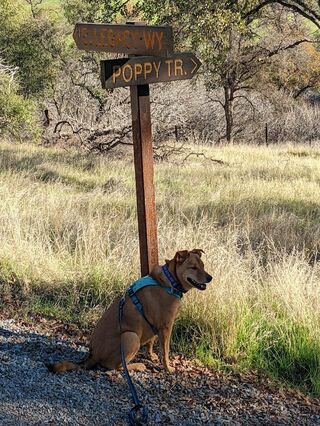Environment
Why Dogs Should Have More Control Over Their Lives
Creative paths to greater psychological integrity.
Posted May 18, 2022 Reviewed by Gary Drevitch
Key points
- The single most significant problem facing homed dogs is lack of adequate agency.
- Having a sense of control over one’s environment is fundamental to psychological integrity.
- There are countless creative ways to enhance a dog's agency.

If I could identify the single most significant problem facing homed dogs right now it would be lack of adequate agency. Dogs have very little control over their sensory environment, their social interactions, and the basic elements of daily survival, all of which are orchestrated by human guardians. This lack of control—a near-total loss of agency—has significant fallout for their physical and especially their psychological well-being. Fortunately, there are countless easy ways to enhance our dogs’ agency—the only limit is our imagination.
Loss of Agency
Agency is the ability to make choices for oneself, to exert control over one’s environment, and, more important, to have the perception of being in control. Pet dogs experience a loss of agency in relation to the overall arc of their lives. They rarely get to choose their home, nor can they choose to leave if they are unhappy; they cannot choose their family or friends; nor do they have much choice about how to provision food, when or where to go to the bathroom, or when to mate, bear, and raise young. Loss of agency also occurs in various small but significant ways throughout the day—for example, the imposition of a collar and leash on free movement, unwanted and invasive touching by unfamiliar humans, and the suppression through training regimens of natural canine behaviors such as barking or seeking affection.
A Sense of Control is Essential to Well-Being
Having a sense of control over one’s environment is fundamental to psychological integrity. This is as true for humans as it is for other animals, including dogs. As veterinarian Frank McMillan argues in “The Mental Health and Well-being Benefits of Personal Control in Animals,” a vast body of research on human and nonhuman animals has established that having a sense of control over one’s life circumstances, and especially over events or stimuli that are unpleasant, is a strong predictor of positive feelings and mental well-being. Particularly when faced with an aversive stimulus, the perception of being in control—of being able to move away from or reduce the intensity or duration of an aversive event—makes the experience more tolerable; feeling out of control increases the stress response to negative stimuli.
Exerting control over one’s environment also seems to be rewarding in and of itself. McMillan cites a series of experiments with captive rodents which found that the animals “exercise control virtually any chance they get” and appear to find it intrinsically rewarding to exert a high degree of control over their environment.[i]
The process of making choices and exerting control promotes psychological well-being. But it may also be that actual choices animals make are important to them. They might make different choices for themselves than we make for them, choices more aligned with their preferences and needs than with our own. Aren’t there also some situations in which dogs might be able to make better choices than people? This certainly happens all the time on a small scale: You see a person walking a dog on a leash and the dog is sending clear signals that she would like to avoid a close interaction with a passing dog. The guardian ignores the dog’s choice, the dogs are pulled together by force, and they find themselves in an extremely uncomfortable situation that may lead to fear, anxiety, even injury.
Empowering Dogs
Empowering dogs is good for them in direct ways: Not only might they make different and better choices for themselves than we might make for them, the process of making and implementing choices improves their well-being by giving them control over their lives. Lack of control can be unpleasant, even psychologically harmful. A dog with greater agency is a happier dog. Moreover, through the process of choice-making, dogs have opportunities to learn and develop.
Empowering dogs is also good in indirect ways, because it helps shift the moral paradigm for humans. The act of respecting dogs’ interests in making choices is a way of acknowledging and respecting their intrinsic value. It also goes some small way toward redressing power asymmetries in human-animal relations.
Luckily, even within the structural constraints of current dog-keeping practices, we have many opportunities to enhance dog agency. The first step is to become more mindful of the ways in which choice and control are lost or constrained. The second step, of course, is to create or embrace opportunities for choice whenever they arise.
Making Space for Agency
Agency, control, choice—whatever term we decide to use—is very much on the mind of thoughtful dog guardians. When I talk to people who live with dogs and try their best to give their dog a good and happy life, I am constantly inspired by the myriad ways in which they try to make space for the dog to express opinions and preferences, collaborate in decision-making, and feel in control.
Here are a few specific ways we can make space for agency. All require that we listen actively to our dog and pay attention to body language, facial expression, and vocal communications.
- When out for a walk, let your dog choose the direction, pace, and length of the excursion. If your dog wants to stop and sniff here and there, let her.
- Protect your dog from unwanted social interactions with other dogs or humans. Dogs should be able to control when, how closely, and with whom they interact—especially in cases where interaction makes them afraid or uncomfortable. Being “friendly” is not a requirement for being a “good” dog.
- Make sure your dog gives consent for any petting or other physical touching, whether by you or by unfamiliar people. Unwanted touching may be experienced as a loss of control.
- Give your dog the choice to walk away from a training session. Training should be by invitation only and dogs should have the right to politely decline.
- Accept “no” as an answer from your dog (unless her safety is at risk).
- Be open to inquiries from your dog. Can I please have a taste of your lunch? Can I go outside? Can we play tug?
- When within the confines of your home, let your dog have access to as much space as possible. (Being locked in a crate dramatically reduces a dog’s sense of control over her environment.)
Facebook image: Zivica Kerkez/Shutterstock
References
[i] Frank McMillan, “The Mental Health and Well-being Benefits of Personal Control in Animals,” in Mental Health and Well-being in Animals (2nd ed), edited by Frank D. McMillan. Wallingford, Oxfordshire: CABI, 2019, p. 67.




